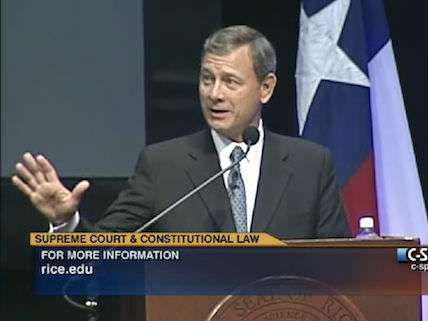New York Times Prefers John Roberts Over His Libertarian Critics
Liberal pundit alarmed by competing versions of legal conservatism.

Over the past three decades, a fierce debate has been occurring within the ranks of the conservative legal movement. Stated broadly, this debate has pitted advocates of judicial restraint, which is the idea that the courts should defer to the democratically accountable branches of government whenever possible, against advocates of judicial engagement, which says that the courts owe no deference to the will of the majority and are instead duty-bound to keep the other branches in check. In 2012 this debate took center stage at the U.S. Supreme Court, when a libertarian-fueled coalition sought to overturn the Patient Protection and Affordable Care Act, only to be rebuffed by Chief Justice John Roberts, who upheld Obamacare as an act of conservative judicial restraint.
Writing today in The New York Times, liberal pundit Linda Greenhouse looks on in horror at the implications of this debate:
The problem, from the point of view of the chief justice's critics, isn't only that he voted the wrong way, but that on a deeper level, he didn't get the memo. John Roberts is conservative, beyond any doubt, but he's a 20th-century conservative in a 21st-century world.
Remember when "judicial activism" was a nasty label that conservatives hurled at liberals and when "legislating from the bench" was the worst thing a judge could do? Not, it seems, any more. Josh Blackman and Randy Barnett, two law professors who are advising Senator Rand Paul's presidential campaign (Professor Barnett was an architect of the first Affordable Care Act case), wrote in the conservative Weekly Standard last month that "presidential candidates should reject the vapid labels of 'restraint' and 'legislating from the bench.'" Rather, they argued, "The heart of the inquiry should be whether the nominee is willing to engage and enforce the Constitution against the other branches, not whether they can parrot clichés about 'strict constructionism' or 'calling balls and strikes' during a confirmation hearing." In other words, judicial "engagement" is good. Judicial restraint is a dereliction of duty.
Greenhouse doesn't come right out and say so, but it's clear that she's disgusted by libertarianism and plainly prefers the brand of legal conservatism in which judges like Roberts keep on deferring to laws like Obamacare. As Institute for Justice lawyer Clark Neily quipped on Twitter in response to Greenhouse's column, "Fans of big-govt increasingly anxious about #JudicialEngagement. They should be."
Indeed they should. As I document in my recent book Overruled, the long war between these two competing legal philosophies is increasingly trending away from the conservative judicial deference favored by John Roberts and towards the libertarian judicial engagement favored by Randy Barnett. If that trend continues, the resulting intellectual shift is likely to have a profound impact on American law in the years to come.
Related: Conservatives v. Libertarians: The debate over judicial activism divides former allies


Show Comments (45)